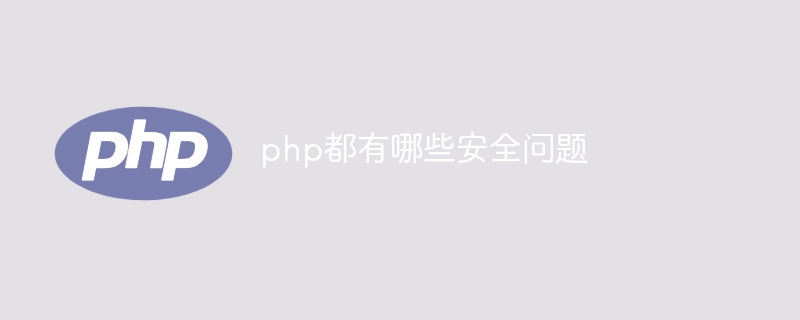
php security issues include: 1. SQL injection attacks, which change the behavior of database queries by inserting SQL statements into user-entered data; 2. Cross-site scripting attacks, which exploit security vulnerabilities in web applications. , an attack method that injects malicious scripts into users; 3. Cross-site request forgery, which exploits users to click on malicious links or visit malicious websites when they are logged in; 4. Files contain vulnerabilities, by controlling the file path Parameters to include other files to execute malicious scripts or read sensitive information; 5. Improper server configuration.

The operating system of this tutorial: Windows10 system, PHP version 8.1.3, DELL G3 computer.
PHP, as a popular programming language, is widely used in the development of web applications. However, like any other language, PHP has some security issues that need to be noted and dealt with. This article will introduce some common PHP security issues and provide corresponding solutions.
1. SQL Injection:
SQL injection means that the attacker changes the behavior of database queries by inserting SQL statements into the data entered by the user. . This can allow a malicious user to obtain, modify, or delete data in the database. To prevent SQL injection attacks, developers should use prepared statements (Prepared Statements) or parameterized queries (Parameterized Queries) to ensure that user-entered data is not inserted directly into SQL query statements.
2. Cross-Site Scripting (XSS):
Attack method of injecting malicious scripts. Attackers can steal users' sensitive information, such as login credentials, session IDs, etc., by embedding malicious code in web applications. To avoid XSS attacks, you can use HTML escaping functions to filter user-entered data or use a secure template engine.
3. Cross-Site Request Forgery (CSRF):
CSRF attack is when the attacker takes advantage of the user to log in, by inducing the user to Attacks are carried out by clicking on malicious links or visiting malicious websites. An attacker can perform harmful operations by forging requests containing user authorization information. To prevent CSRF attacks, you can use CSRF tokens to verify the origin of the request when a user submits a form.
4. File Inclusion Vulnerabilities:
File inclusion vulnerabilities mean that the attacker controls the file path parameters to include other files to execute malicious scripts or read sensitive information. To prevent file inclusion vulnerabilities, you should avoid passing user-entered values directly to functions such as include() or require(), and instead use trusted file names or paths.
5. Improper server configuration:
PHP applications often rely on the configuration of the server to run. If the server is not configured properly, it may cause security issues. For example, if a server has error reporting enabled and displays sensitive information, an attacker could use this information to launch an attack. To ensure a secure server configuration, you should turn off error reporting, limit file system access, and regularly update your server with patches.
Summary:
As a popular programming language, PHP has been widely used in web application development. However, PHP also has some security issues, such as SQL injection, XSS attacks, CSRF attacks, file inclusion vulnerabilities, and improper server configuration. To ensure the security of PHP applications, developers should take appropriate security measures, such as using prepared statements, HTML escape functions, CSRF tokens, trusted file names and paths, and properly configuring the server. Only in this way can we better protect the data security of PHP applications and users.
The above is the detailed content of What are the security issues in php?. For more information, please follow other related articles on the PHP Chinese website!